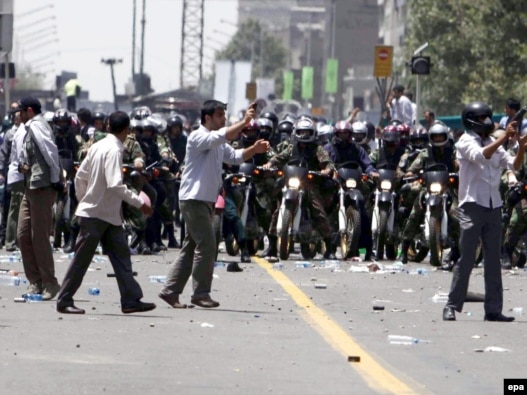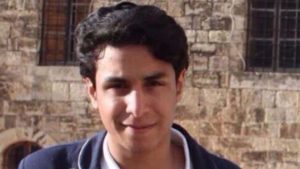
Source: http://www.rferl.org/content/Western_Nations_Criticize_Iran_Rights_Record_At_UN_Meeting/1958305.html
West Criticizes Iran Rights Record At UN Council Meeting
The countries, including Britain and France, also called for an international probe into the violence that followed the election in June 2009.
French Ambassador Jean Baptiste Mattei said during the meeting in Geneva that the human rights situation has worsened in the Islamic republic since the election, in which President Mahmud Ahmadinejad was named the winner in the first round just hours after polls closed.
“The situation has seriously deteriorated over the past eight months. The authorities are waging a bloody repression against their own people, who are peacefully claiming their rights,” Mattei said.
The United States condemned the “unjust” repression of “innocent Iranian citizens” that was seen after opposition supporters protested the outcome of the election.
U.S. Assistant Secretary of State Michael Posner called on Iran to lift restrictions on free speech, end the reported torture of political prisoners, and stop “show trials” of dissidents.
“We’re deeply concerned also about status of detainees in Iran, including foreign nationals, American citizens, and lack of due process accorded them,” Posner said. “In addition of last year’s improper show trials there are credible reports of torture and cruel, inhuman, or degrading treatment.”
Call For UN Investigation
The announcement of Ahmadinejad as the winner led to mass protests in Tehran and other Iranian cities, as the president and other top officials rejected accusations that the election result was engineered through massive fraud.
The ensuing and continuing crackdown against the opposition has resulted in the arrest of more than 2,000 activists and human rights defenders, a number of whom have faced trial. Two people have been executed after being found guilty in connection with the unrest, although at least one was arrested before the election.
Germany said today it was deeply concerned about the way the Islamic republic treated those who took part in the protests that followed the election.
Britain voiced similar concerns. Britain’s ambassador in Geneva, Peter Gooderham, recommended that Iran invite UN Secretary-General Ban Ki-moon to “investigate the postelection violence and independently assess the human rights situation.”
Senior diplomat Seyed Hossein Rezvani, a member of the Iranian delegation, told reporters that an international investigation was “totally out of the question,” since the country’s own judicial system was capable of examining allegations of wrongdoing.
But he claimed Iran had issued an open invitation to all of the UN’s independent investigators to visit the country.
Deadly Prison Closed
Other members of the Iranian delegation defended the country’s human rights records and accused Western countries of a double standard. One attendee described the June vote as an epic poem of democracy.
The head of the delegation, Mohammad Javad Larijani, said Iran “has taken a genuine and long-term approach to safeguarding human rights.”
As an example, Larijani noted the closure of the Kahrizak detention center, where at least three postelection detainees are known to have died after being tortured.
“The minute that we discovered that there was some wrongdoing over there [in Kahrizak], it was closed in less than 24 hours,” Larijani said. “Please compare that with Guantanamo and Abu Ghraib prisons. Whether they were closed in such a rapid procedure, or not?”
Religious Persecution
Aside from the postelection crackdown, a number of countries expressed concern over death sentences handed down to juvenile offenders and political prisoners in Iran. Canada called on Iran to stop issuing such sentences.
Discrimination and pressure on religious minorities, including the Baha’is and Sufis in Iran, was also criticized today by Western countries, including the United States.
Iran reacted by saying that all recognized minorities in the Islamic republic enjoy the same rights. Larijani said no Baha’i in Iran has been prosecuted because of his or her faith.
“Baha’is [who] are pursued in Iran through legal structure are those who are indulged in cult type of activity — cult type of activity is against all the basic human rights of the people,” Larijani said.
The UN representative of the Baha’i International Community, Diane Ala’i, however, told RFE/RL’s Radio Farda that the Iranian delegation’s claims about the Baha’is were untrue. “Baha’is have no rights in Iran and they get persecuted only because of their religion,” she said.
Several countries, including Cuba and Venezuela, defended Iran’s human rights record. Brazil’s representative said Iran’s presence in Geneva demonstrates its commitment to human rights, and Russia’s representative praised Iran for its fight against illiteracy.
“Iran’s intention to develop a national strategic action plan in the area of human rights deserves support, as well as does the development of the question of creating in Iran a national human rights organ,” the Russian envoy said. “We note the progress Iran has made in fighting illiteracy.”
‘Human Rights Tragedy’
Today’s three-hour debate before the Geneva-based council was eagerly anticipated by human rights groups who have strongly criticized rights abuses in the Islamic republic, particularly the execution of minors, mistreatment of postelection detainees, and the jailing of journalists.
On February 12 Iranian Nobel Peace Prize laureate Shirin Ebadi called on the world to help before it is too late. “If this situation continues in Iran, I must warn that the day will come when the young Iranian people will no longer be able to endure government violence. They will reach the end of their rope,” Ebadi said, warning of a “human rights tragedy” in Iran.
The UN Rights Council is due to issue its report of today’s session on February 17. Media watchdog Reporters Without Borders has called for the Iranian government to be censured “for its serious human rights violations.”
But Larry Cox, the executive director of Amnesty International in the United States, told RFE/RL on February 11 that he didn’t expect much from today’s session.
“The hopes are that because precisely of what’s been happening in the last months and even in the last days, that if ever there’s a moment when governments should find the ability to ask hard questions — this should be it,” Cox said.
“But I am afraid that I will be, as I often am, disappointed in the performance at the council.”
RFE/RL correspondent Nikola Krastev contributed to this report from New York



